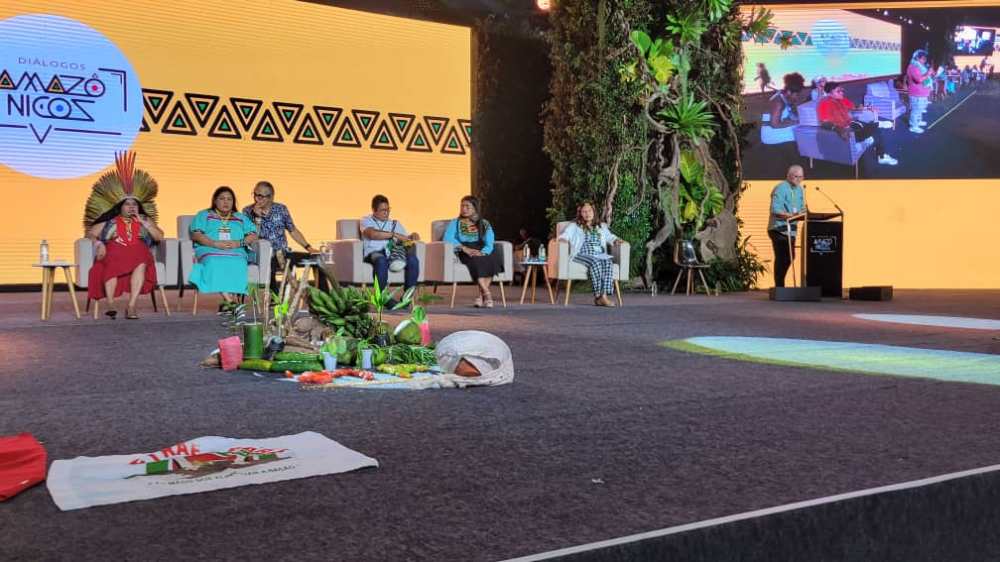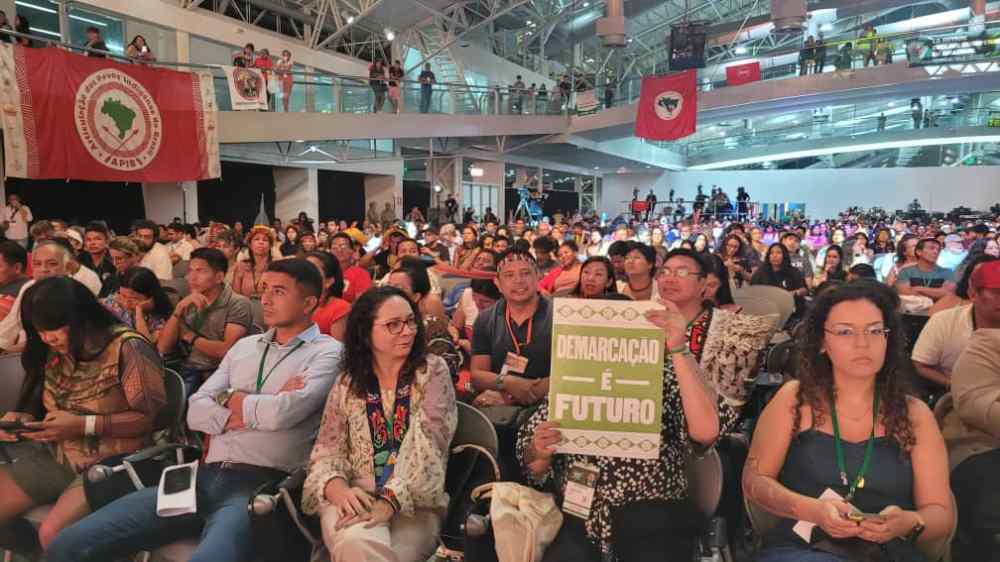This Sunday, August 6, the “Amazon Dialogues” culminated in Belém Do Pará, Brazil, with the participation of more than ten thousand people from eight Amazonian countries: Bolivia, Peru, Ecuador, Colombia, Brazil, Guyana, Suriname and Venezuela.
Representatives of the various social movements, research centers, government agencies, indigenous peoples and communities, Afro-descendants and mestizos, held different discussions covering issues of direct concern to the Amazon. They debated climate change, the well-being of Amazonian indigenous communities and projects focused on sustainable and inclusive development in the region. In addition to agroecology, the livelihoods of forest workers and the need to combat illegal mining and deforestation. The results of these discussions will be presented as proposals to the heads of state during the Amazon Summit meeting to be held August 8-9 in Brazil, within the framework of the IV Meeting of the Presidents of the Amazon Cooperation Treaty Organization (ACTO).
Venezuela: vindication of indigenous rights
 During the Amazon Dialogues, the intervention of the Minister of People’s Power for Indigenous Peoples of Venezuela, Clara Vidal, stood out. During her presentation, she underlined the vindication of the rights of the native peoples that began during the government of Commander Chávez, which continue to be sustained by the current Venezuelan President, Nicolás Maduro Moros.
During the Amazon Dialogues, the intervention of the Minister of People’s Power for Indigenous Peoples of Venezuela, Clara Vidal, stood out. During her presentation, she underlined the vindication of the rights of the native peoples that began during the government of Commander Chávez, which continue to be sustained by the current Venezuelan President, Nicolás Maduro Moros.
Minister Clara Vidal made an analogy between the achievements reached in Venezuela and the possibilities of struggle for all the indigenous peoples living in the Amazon, the “Great Shabono”, as she called it, taking as a reference the Yanomami indigenous customs.
One of these rights claimed by the Venezuelan government is the legitimacy of the native peoples to own the lands which, as Minister Clara Vidal pointed out, are territories “where they have lived since time immemorial”. Hence, the current conflict over the demarcation of territories is a debt for some of the States that make up the Amazonian space. Furthermore, land demarcation is one of the main legal tools for establishing a barrier to the advance of deforestation in the Amazon.
In this regard, the official also called for the “eradication of deforestation”. According to the World Wildlife Fund (WWF) report “Amazonía Viva 2022”, 18% of Amazon forests have been completely lost and 17% are almost totally degraded. Hence the urgency to save the Amazon from human depredation, which if this devastation continues would affect the direct livelihood of about 47 million people, would jeopardize food security and would make it impossible to stop the increase in global temperature.
On the other hand, the Venezuelan Minister for Indigenous Peoples, Clara Vidal, denounced how the unilateral coercive measures imposed by the government of the United States on Venezuela have seriously affected the life of the indigenous peoples living within the South American country, as well as in the common border areas of the Amazon. Vidal stressed “despite the fact that the Venezuelan people and the government of President Nicolás Maduro have been subjected in the last 10 years to more than 900 unilateral coercive measures of an economic, financial and political nature issued by the Government of the United States, we continue to work to guarantee the claims of the rights of our native peoples”.
Changing the model to save the Amazon
The fact that the Amazon is a territory rich in resources is directly related to the causes of its plundering and destruction. Its glittering riches in gold, oil, copper, timber, seem today to adopt the somber colors of its ruin, which at the same time is the destruction of all. The exploitation of the natural resources of this area of the planet causes a dramatic plundering of its resources that objectively affects the whole world: for every five glasses of water we drink, one comes indirectly from the Amazon.
Hence the important assertion made by Minister Clara Vidal regarding the “proliferation of a global economic model of exploitation that is aimed not at the protection but at the destruction of the Amazon”. For this reason the alternative may lie precisely in the indigenous peoples and the establishment of sustainable development models that can protect the rainforest and rivers, but also support a vibrant economy and higher standards of living for the Amazonian population. Where science is at the service of ancestral knowledge, complementing in synergy scientific knowledge and the social and cultural practices of indigenous peoples.
The Amazon does not only involve ecology
But the devastation of the Amazon is not only an ecological issue; the social dramas generated by depredation and plundering affect defenseless populations, who in some cases are left at the mercy of the law of the strongest. Minister Clara Vidal made reference to the fact that the Amazon “that natural altar, that ancestral paradise can become a space for drug trafficking, for the establishment of illegal armed groups, for human trafficking and smuggling, for criminality, and in the long run even for the loss of our culture and identity and the extinction of our native peoples”. A real tragedy that intensifies with the savage exploitation of copper mines in the Ecuadorian Cordillera and the trafficking of timber that spills blood in the triple border between Colombia, Brazil and Peru, among other dramas that are lived daily in the Amazon.
These Amazon Dialogues continue to open the windows of the world to a region that is definitely not another world, distant and exotic; on the contrary, it is a mirror of our own, of the space where we live. Let us hope that with the next celebration of the Amazon Summit, the necessary actions will be taken, beyond words, to save and protect the Amazon, which in short we must be aware that it is a matter of life or death not only of biodiversity, but of all of us who inhabit this planet.
Yoselina Guevara López: social communicator, political analyst, columnist in different international media, whose work has been translated into English, Italian, Greek and Swedish. Winner of the Simón Bolívar 2022 National Journalism Award (Venezuela), special mention Opinion; Aníbal Nazoa 2021 National Journalism Award (Venezuela); I Historical Memory Contest Comandante Feliciano 2022 (El Salvador) Third place.
Declaration of Belém Do Pará: A Roadmap to Save the Amazonia
